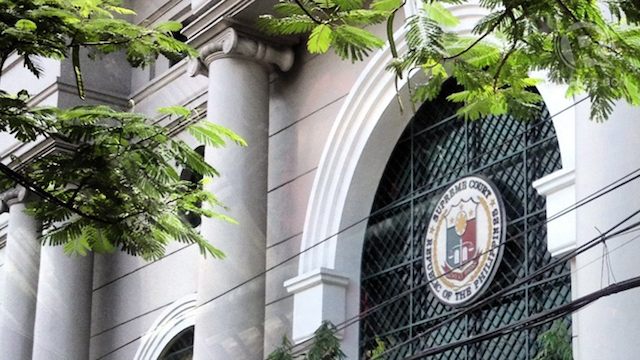SUMMARY
This is AI generated summarization, which may have errors. For context, always refer to the full article.

MANILA, Philippines – “The burden is on the petitioners to establish their case and prove grave abuse of discretion on the part of the respondents.”
In a 41-page document, Malacañang through the Solicitor General on Thursday, November 7, asked the Supreme Court to dismiss the cases against the Disbursement Acceleration Program (DAP) for lack of merit and also deny applications for temporary restraining order on the government’s controversial booster program.
At least 8 petitions have been filed questioning the legality of DAP before the High Court.
On Monday, November 11 – the first day of oral arguments on DAP, the Solicitor General, representing the executive branch, is expected to stress what Malacañang has repeatedly argued in the past: that DAP is a program, and not a fund, countering criticisms that DAP is a “budget within a budget.”
In his reply to the petitions against DAP, Solicitor General Francis Jardeleza argued that the Court has no jurisidiction to resolve the controversy.
“Defining the contours of savings, characterizing impoundment, and crafting various solutions to the occasional tug-of-war between these two branches of government fall largely within the realm of politics and lawmaking, not constitutional interpretation. We ask the Honorable Court to take note of the fact that various bills involving the litigated issues in this case have been filed by different legislators of diverse political backgrounds and inclination,” the document read.
“It may very well be that the solutions to the perceived problems of petitioners about good governance are to be found in the democratic arena, not in the session hall of the Supreme Court,”it added.
Earlier, the Supreme Court said oral arguments will focus on 6 issues about DAP (SC urged: Gag Aquino, Cabinet on DAP):
- The real nature of the DAP (whether it’s a fund or a program)
- The legal basis for the creation of the DAP
- The constitutionality of the DAP based on fund releases upon requests of specific legislators
- The definition of “savings” as used in the Constitution and relevant issuances
- The legality of the DAP as a program based on existing laws
- The constitutionality of the use of DAP funds to augment GAA appropriations.
President Benigno Aquino III has staunchly defended the DAP, going to the extent of making a televised public address to point out its benefits. (Aquino: I am the one being called the ‘Pork Barrel King’?)
Salient points
Here are the salient points of the Solicitor General’s final comments in response to the charges raised against DAP in Court:
Petitioners’ argument: No law was passed and promulgated for the creation of the DAP
Malacañang argues that DAP is a constitutional exercise of the President’s power to spend.
In the first place, the Palace said, there is no need to pass a new law since the DAP is not a fund but merely a program of “prioritizing spending.”
“Considering that the DAP is but a label to categorize administrative action and express existing powers of the President under the Constitution, the Administrative Code, and the relevant GAAs, petitioners’ argument that it is a source of additional powers or that it is in contravention of the powers of Congress is palpably ungrounded.”
On whether DAP augmented new budget allocations or lists not approved by the legislature
The Palace maintains that DAP was not used to fund items that were not included in the budget, which is an unconstitutional act.
Petitioners have questioned item 5.7.3 of the Department of Budget and Management’s National Budget Circular 541, which states that unobligated allocations “may be used to augment existing programs and projects of any agency and to fund priority programs and projects not considered in the 2012 budget but expected to be started or implemented during the current year.”
Legal questions rest largely on the phrase “to fund priority programs and projects not considered in the 2012 budget.”
But the Solicitor General said the phrase may have been misinterpreted by critics.
“Item 5.7.3 of NBC 541 only means that withdrawn allotments may be used to (1) augment existing programs and projects; and (2) fund appropriated programs and projects that were previously not considered “priority” in the 2012 budget, but ended up being prioritized in 2013 and therefore “to be started or implemented during the current year,” it said.
“In other words, for the second part of Item 5.7.3, it is the priority status of the program or project, not its existence, that was not previously considered in the 2012 budget,” it added.
Malacañang also challenged critics to “bring the debate to the level of facts” and point out specific disbursements NBC 541 for projects they claim were not included in the GAA.
On whether DAP is a presidential impoundment scheme
The Palace denies such claims, saying that it is only when the agencies themselves declare to the DBM that they cannot obligate these allotments that they are finally withdrawn by the President.
“It is not an impoundment scheme – NBC 541 is not an impoundment scheme precisely because the real objective is to put agencies on notice that their unobligated allotments might be withdrawn if they failed to obligate, and therefore spend, their allotments.”
On the privilege of legislators to propose DAP projects
Malacañang said the question on whether the opportunity given by the executive branch to lawmakers to identify funds under DAP was selective was “irrelevant.”
Besides, the executive branch argues there is nothing in the Constitution that bars legislators from recommending to the President how they may use his department’s savings.
“On the contrary, what petitioners consider as the objectionable feature of the questioned recommendations—the absence of such a mechanism in the GAA—is what respondents consider their strongest constitutional characteristic,” the comment said. “It is precisely the absence of any law which provides for participation by legislators that makes the DAP legitimate.” – Rappler.com
Add a comment
How does this make you feel?





There are no comments yet. Add your comment to start the conversation.